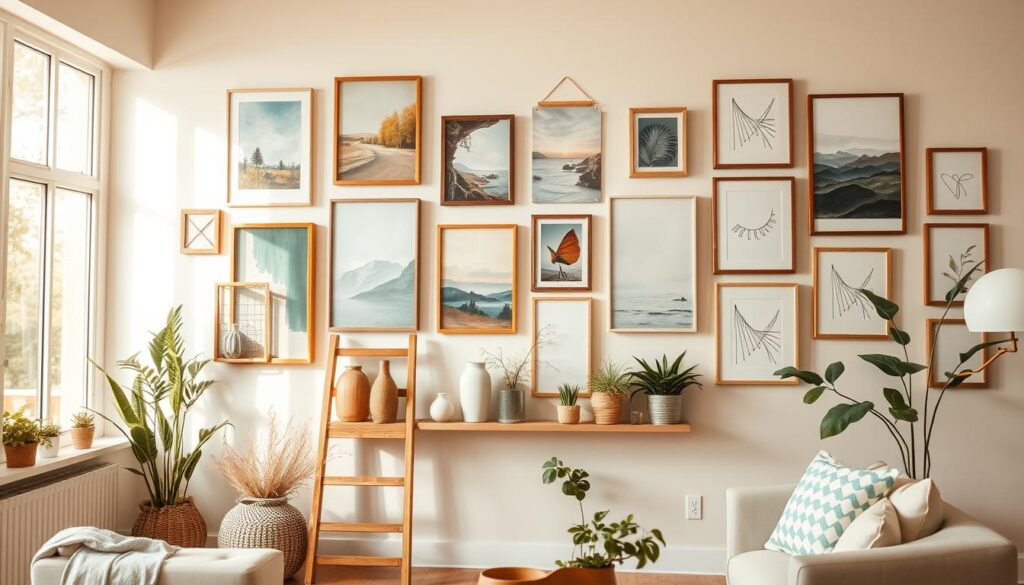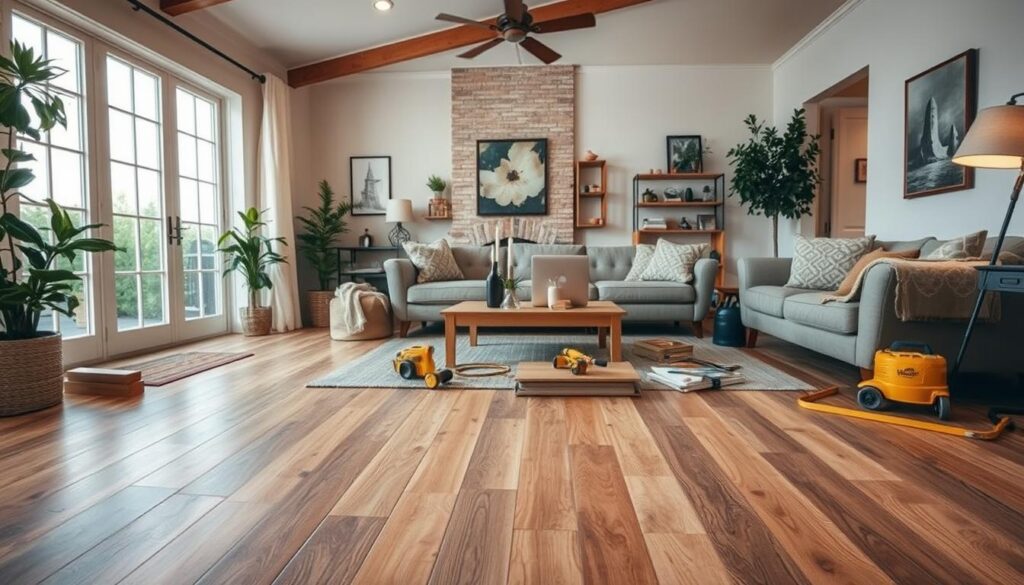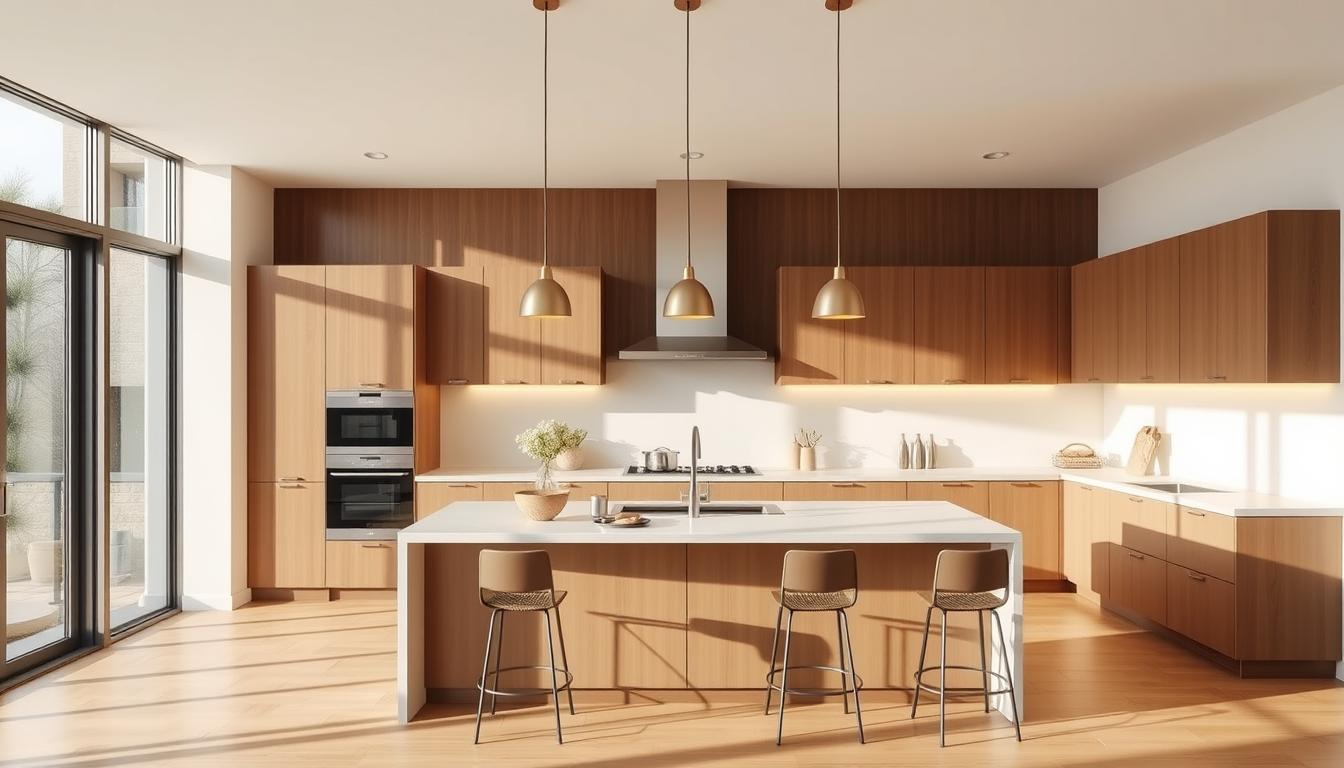Did you know a simple change in your interior decorating can boost your mood and productivity? You can update your space without spending a lot with budget-friendly home decor ideas. Experts say starting with a mood board and setting a budget are key steps for a successful DIY project.
We’ll show you our favorite DIY home interior design ideas that are easy and fit all tastes and budgets. You’ll learn about accent walls and DIY flooring options. We’ll give you practical tips and inspiration to make your living space look new.
Key Takeaways
- Start with a budget and a mood board for a successful DIY project.
- Explore various DIY home interior design ideas to suit your taste.
- Update your space with budget-friendly decor solutions.
- Consider accent walls and DIY flooring for a fresh look.
- Transform your living space with our curated list of DIY projects.
Embrace Color with Accent Walls
An accent wall can be the room’s star with the right color and technique. Accent walls bring a pop of color and personality. By picking the right colors and application, you can turn a plain wall into a stunning feature that shows off your style.
Choosing the Right Color Palette
Picking the perfect color for your accent wall is key. Think about the room’s colors and the mood you want. Soft blues and greens create a calm vibe. Bold colors like red or orange make a statement.
Also, consider the room’s lighting. Colors look different under different lights. Test the paint or wallpaper on the wall before deciding.
Techniques for Applying Paint
After picking your color, it’s time to apply it. There are several ways to do this, including:
- Brush Painting: Ideal for a smooth finish.
- Roller Painting: Great for big areas fast.
- Sponge Painting: Adds a textured look.
Each method has its own benefits. The choice depends on the finish you want and how comfortable you are with the process.
| Technique | Finish | Difficulty Level |
|---|---|---|
| Brush Painting | Smooth | Easy |
| Roller Painting | Textured | Moderate |
| Sponge Painting | Mottled | Challenging |
Using Wallpaper for Texture
Wallpaper is great for adding texture and interest to your accent wall. There are many patterns and materials to choose from. You can find the perfect wallpaper to match your room’s decor.
“Wallpaper can add depth and character to a room in a way that paint simply can’t.” –
For a modern look, try a geometric pattern. For a traditional feel, go with a floral design. Make sure to measure your wall and pick wallpaper that fits your wall type.
Upcycling Furniture for a Unique Look
Upcycling furniture is a green and creative way to make your home special. It turns old, unwanted items into useful, artistic pieces. This way, you get a stylish interior design inspiration without spending a lot.
Looking for affordable home decor solutions? Upcycling furniture is a great choice. It cuts down on waste and lets you make unique items that show off your style.
Finding Furniture to Upcycle
Start by finding the right furniture to upcycle. Check out local thrift stores, garage sales, or online for great finds. Look for solid, quality furniture that needs a bit of care to look new again. For ideas, visit sites focused on repurposed and upcycled decor.
Best DIY Techniques for Upcycling
After picking your piece, it’s time to get creative. Popular DIY methods include:
- Reupholstering: Update old chairs and sofas with new, trendy fabrics.
- Painting: A fresh paint job can change a piece’s look. Pick colors that fit your decor or go for something bold.
- Refinishing: For wood furniture, refinishing reveals the natural beauty of the wood, adding warmth and character.
Tips for Painting and Finishing
For painting and finishing, keep these tips in mind:
- Prepare the surface: Clean and sand the furniture for a smooth finish.
- Choose the right paint: Pick paint that’s right for your furniture’s material, like latex for walls or specific furniture paint.
- Seal your work: Apply a clear coat to protect your finish and extend its life.
By following these steps and tips, you can make stunning, unique pieces. These add a personal touch to your home decor while keeping your budget in check.
Creating a Cozy Atmosphere with Lighting
Lighting is a key part of interior decorating tips. It can make a room feel cozy and inviting. The right lighting can change how a room feels, making it more welcoming.
Types of Lighting to Consider
There are many types of lighting for a cozy feel. These include:
- Ambient lighting, which lights up the whole room
- Task lighting, for activities like reading or cooking
- Accent lighting, to highlight certain areas
DIY Light Fixtures to Enhance Rooms
Making your own light fixtures is a great home decorating on a budget idea. You can try:
- Mason jar pendant lights for a rustic look
- Reclaimed wood chandeliers for a unique centerpiece
- String lights for a cozy, whimsical feel
Layering Lights for Depth
Layering lights is essential for a cozy feel. It means using different light sources at various levels. This creates a warm and inviting glow.
| Lighting Type | Purpose | Examples |
|---|---|---|
| Ambient | Overall illumination | Ceiling fixtures, LED strips |
| Task | Specific tasks | Desk lamps, under-cabinet lighting |
| Accent | Highlighting features | Spotlights, fairy lights |
Incorporating Nature Through Greenery
Adding plants to your home is a budget-friendly way to make it look better. Plants not only make your home look good but also make it healthier.
Choosing the right plants is key. Selecting the right plants helps them grow well and improve your space.
Selecting the Right Plants for Your Space
Think about the light, temperature, and care you can give when picking plants. For easy care, try succulents or air plants. Bright spaces are great for colorful plants like African Violets or Begonias.
Here’s a simple comparison of some popular low-maintenance plants:
| Plant Type | Lighting Needs | Watering Needs |
|---|---|---|
| Succulents | Low to Bright Light | Infrequent Watering |
| Air Plants | Bright Light | Occasional Soaking |
| Snake Plants | Low to Bright Light | Infrequent Watering |
DIY Planters for a Personal Touch
Making your own planters adds a personal touch. Use old containers like mason jars or wooden crates. Getting creative with materials like terracotta pots or recycled plastic bottles makes unique planters.
For a rustic look, try using reclaimed wood or old pallets. A DIY expert says, “Upcycling old items into planters not only reduces waste but also adds character to your home.”
“The garden is a love song, a duet between a human being and Mother Nature.” – Jeff Cox
Placement Tips for Natural Light
Place plants where they get the right light. Observing the light patterns in your home helps find the best spots.
Put bright light plants near south-facing windows. Low light plants do well near north-facing windows. Mirrors can also help reflect light to shadier areas.
By choosing and placing plants wisely, you can make your home more welcoming. Whether you’re new to gardening or experienced, adding plants is a simple way to refresh your decor.
Maximizing Small Spaces with Smart Design
With a few simple design tricks, you can turn even the smallest space into a cozy retreat. To maximize small spaces, focus on furniture, storage, and layout.
Multi-Functional Furniture Ideas
Using multi-functional furniture is a smart way to make the most of small spaces. Items like a storage ottoman or a sofa bed can do double duty, cutting down on clutter and boosting functionality.
Think about getting a murphy bed or a desk with built-in storage to free up floor space. These pieces are not just useful but also help keep your home neat and organized.
DIY Storage Solutions to Save Space
DIY storage solutions are a fantastic way to save space and add a personal touch. You can make your own storage using reclaimed wood or old furniture.
- Use old crates or boxes for a unique storage setup.
- Install shelves or a pegboard on a wall to use vertical space.
- Make a hidden storage spot behind a mirror or art.
Creative Ways to Utilize Vertical Space
Using vertical space is key in small homes. By making the most of your walls, you can clear your floors and surfaces. This makes your home feel more open and flowing.
Try using wall-mounted shelves or storage units that go up to the ceiling. This not only adds storage but also makes the room look bigger by drawing the eye upwards.
By using these smart design tips, you can make your home functional, stylish, and cozy, even in the smallest of spaces. Whether you’re into creative home improvement ideas or easy home renovation projects, focusing on space is a great starting point.
Personalizing Your Decor with Art
Adding art to your space brings character and warmth. It makes your home feel inviting and unique. It shows off your personality and style.
Crafting Your Own Wall Art
Making your own wall art is a special touch. You can use canvas, wood, or recycled items. This way, you create pieces that show your style.
Think about using abstract designs or geometric patterns. You could also add personal photos or meaningful quotes. This adds a personal touch to your art.

Displaying Photos and Memorabilia
Showing off photos and memorabilia makes your space personal. You can hang a gallery wall with family photos or travel souvenirs.
For elegance, use frames that match in style or color. Or, mix different styles for a unique look.
Choosing Frames and Arrangements
Finding the right frames can be hard. Think about your room’s style and colors when choosing.
Uniform frames create a cohesive look. But, mixing styles adds interest. Try different layouts on the floor before hanging.
- Start with your biggest or most striking piece in the center.
- Place smaller pieces around it to balance the look.
- Step back and adjust until it looks right.
By adding art, you make your home truly yours. It shows off your stylish interior design inspiration and affordable home decor solutions.
Bringing Warmth with Textiles and Accessories
Textiles and accessories are key to adding warmth and personality to your home. They can change how your home feels, making it cozier and more inviting. By picking the right fabrics and making your own DIY items, you can improve your home’s look.
How to Choose the Right Fabrics
Picking the right fabrics is crucial for the look and feel of your home. Think about the texture, color, and how long it lasts. Cotton and linen are good for a casual vibe, while velvet and silk add luxury. Also, consider how easy it is to clean the fabric.
DIY Cushion Covers and Throws
Making your own cushion covers and throws is easy and affordable. You can use old fabric or buy new that fits your style. To make a cushion cover, measure your cushion, cut the fabric, and sew it. For throws, sew fabric pieces together or use one piece with tassels or fringe.
Creating Your Own Area Rugs
Making your own area rug is a fun DIY project. You can use wool, cotton, or recycled fabric for a unique rug. To start, braid fabric strips or use a rug-making kit. For a challenge, try tufting or hooking a rug.
Adding DIY textiles and accessories can make your home cozy and inviting without spending a lot. Being creative and resourceful is the secret to decorating on a budget.
Updating Floors with DIY Options
DIY floor updates are a cost-effective way to revamp your living space. They can make your home look and feel new. With the right materials and techniques, you can get a fresh look without spending a lot.
Choosing Between Paint and Stain
Deciding between paint and stain is your first step in updating floors. Paint changes the color and look of your floors, offering many color choices. Stain, on the other hand, brings out the wood’s natural beauty, making for a more subtle change.
Choose paint or stain based on your floors’ condition and desired look. For example, if your wooden floors have a stunning grain, stain might be better to keep their natural charm.

Installing Peel-and-Stick Tiles
Peel-and-stick tiles are a great DIY choice for updating floors. They’re perfect for renters or those who want a temporary fix. These tiles are easy to put up and come in many designs, from modern to classic.
To install peel-and-stick tiles right, make sure your floor is clean and dry. Measure your space well to avoid waste. Start from the center of the room and work your way out to keep spacing even.
DIY Carpet Alternatives
If you’re not into traditional carpet, there are DIY alternatives. You can use area rugs or mats for warmth and texture. Or, try using stencils to draw patterns on your hardwood or concrete floors.
Also, consider natural fibers like sisal or jute for a unique, eco-friendly floor. These materials add coziness to your rooms and are durable and easy to care for.
Final Touches: Accessories that Make a Difference
Adding the right accessories can make your home look stylish and inviting. For stylish interior design inspiration, choose items that show off your personal style.
Elevating Your Space with Accessories
To get affordable home decor solutions, mix different textures, art, and small items in your living room. In the kitchen, hang art near the cooker or sink. Use lamps on worktops for more light. Adding rugs, like in galley kitchens, can also make the space better.
Personalizing Your Space
For a unique look, try DIY projects. Add trims to curtains, swap out cushions, or get new art for the living room. In the bedroom, change wardrobe doors to curtains, add new handles, and use rugs, bolster cushions, and throws. These interior decorating tips help make your space welcoming and cohesive.
By adding these finishing touches, you can finish your home decor. You’ll create a space that shows off your personal style. With these easy and smart ideas, you can make your home stylish and welcoming without spending a lot.



